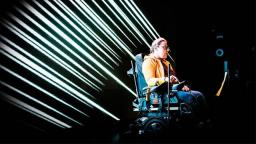
“Once we’re on the other side of this pandemic, once recovery is underway, it will never have been more important for our national culture to engage positively with Disabled people...I think this outcome will be some time away, but I think it’s really important that planning is undertaken now, so all participation barriers for Disabled people are removed as we head into the 2020s. That is going to be the legacy of this awful time.”
- Andrew Miller
Interview written by Chloe Johnson - a Disabled music journalist, writer and editor - as part of Youth Music Next Gen.
Andrew Miller is a member of Arts Council England’s National Council. An arts consultant and broadcaster, he has been raising the profile of disability throughout his 30-year career in the UK’s cultural industries.
Most recently, Andrew has been working on the #WeShallNotBeRemoved arts alliance, which gathers Disabled creatives from across the UK as they battle the rising isolation that Disabled arts communities have felt due to the Covid-19 pandemic. I spoke to Andrew about his thoughts on Youth Music’s new report, Reshape Music, which highlights issues around accessibility for Disabled musicians within the music industries - a problem which has never been more pressing.
Hi Andrew! Can you tell me about your connection to disability and music-making?
I go back with music quite a fair bit because I used to be a music officer at the Arts Council of England in the Midlands, so I was responsible for looking after the City of Birmingham Symphony Orchestra, Welsh National Opera and other classical music in the West Midlands region.
From there, I had a responsibility for opera across the country, and then I changed jobs and became Director of Programming at the Royal Welsh College of Music and Drama in Cardiff, and I was responsible for programming classical and contemporary music - all sorts of music, really! I was there for six years, and at the time I arrived they were in the process of building a new arts centre and concert hall, so my job was to establish it as a new venue.
It was very exciting to be part of that because lots of things were going on - the college obviously had wonderful musicians who were in training there - and the idea of the programme was to focus on the academic work that was going on at the college but to make it accessible to a much wider audience.
When we opened the audiences were quite small, but within about six months we were getting huge numbers of people coming. For example, we did a weekly jazz session in our foyer - when we opened I think about 50 people came but within six months we had about 250 people coming. We hosted BBC Young Musician of the Year at the college for several years...we had all sorts of events, and all sorts of musicians coming to play.
Now my roles have changed and I’m much more involved in policy and supporting Disabled people in the arts and culture sector, but I still have my hand in music as I’m one of the trustees of Welsh National Opera. I used to make television programmes as well. I used to be a director, so I made television programmes usually about music, with mainly pop musicians like Gerry Rafferty, and did some programmes with BBC National Orchestra of Wales - so all that kind of stuff was great, too.
So you have a really strong connection to music making and disability! How have you found Youth Music’s new report findings - were they what you expected?
Yes, there wasn’t anything there that surprised me, and I thought it was a really useful new addition to the documentation and research around youth music and disability. Fundamentally I wasn’t surprised because it did confirm the wide range of issues which I think quite clearly exist.
Clearly music-making for young Disabled musicians is beneficial - yes of course! - but also they are significantly underserved by the industry to source, purchase, learn and practise suitable instruments. And so, I suppose the question I’d have for Youth Music is how are they going to address this? I’d be very interested to see what they propose as it’s an incredibly important issue.
I completely agree with that - how do you think, then, that Disabled musicians could be better supported?
Better resources...really, people listening to what Disabled musicians are saying, the things they say they need to support them. Whether that's access to a suitable practice space, suitable instruments, there's a wide range of things.
What organisations are you seeing recently that are helping break down these barriers?
People like the Paraorchestra - I think they’re doing fantastic work in this area. I’m really impressed by the work that’s happening in music-making in the South West, particularly; for example the Bournemouth Symphony Orchestra’s Resound ensemble and The National Open Youth Orchestra (NOYO).
NOYO do a lot of work with specialist instrumentation; I went to a concert there and it was really impressive, really fantastic, original compositions by Disabled composers using the specialist instrumentation and I left thinking, “these guys are changing the nature of classical music, they are making it so much more relevant in the 21st century”. I think there's loads of exciting examples of best practice happening in the South West - the Resound ensemble of the Bournemouth Symphony Orchestra were actually the first Disabled-led ensemble to perform at the BBC Proms, and that was such a fantastic first.
Bournemouth Symphony Orchestra Resound ensemble
BSO Resound is a professional disabled-led ensemble made up of musicians led by James Rose, BSO Change Maker and Conductor.
Do you have any advice for Disabled musicians trying to break into the industry?
Tenacity. If you have a talent, and determination, then stick with it because you’re going to need it. It is a difficult industry to navigate if you’re a Disabled person, but if you have tenacity it will take you just as far as your talent will. You’re always going to have to push to ensure that people understand your requirements so that you have the chance to shine. But I also think we’re in a moment of such significant change, in all areas of society, that now is a good moment for young Disabled musicians to really make their mark.
I think that recently - with the increase of Zoom and video performance - it has become easier for audiences to see Disabled musicians in a place that accommodates them and is accessible to them. What do you think about this?
I think that the pandemic has created huge possibilities because of technology, previously people were told that you can’t work from home, but we’ve all proved that you can and still be productive! And so I think there's real potential there to apply what we’ve learnt over the last few months and apply that to music and to all areas of society.
I’ve seen videos being produced of orchestras in different spaces online. I think that we’re going to have to, as we’re also learning to live with the virus, learn to live with different ways of doing things, and that's a potential benefit.
Do you have any favourite Disabled musicians at the moment?
I’m very impressed by Lloyd Coleman. He’s a composer who has done a whole lot for the Paraorchestra, he’s just had a new piece broadcast on BBC Radio 3, marking the 250th anniversary of the death of Beethoven. Because Lloyd has a hearing impairment, his take on Beethoven, who also had a hearing impairment, was very interesting. I think that Lloyd is a very talented musician and somebody who is going to make a great impact. There are so many others I could mention - but Lloyd is the one who springs to mind!
Finally, how do you think that increasing accessibility within music will impact wider society?
It’s really important because I would say that creative Disabled people, whether they’re in music or film or drama or television, are at the forefront of changing attitudes to disability. It’s interesting, because sportspeople - Paralympians - haven’t perhaps had the same impact as artists have in really changing societies attitudes to disability, for example around the social model of disability or ableism. So creative Disabled people, including musicians, are at the forefront of changing attitudes.
What I would also say is that once we’re on the other side of this pandemic, once recovery is underway, it will never have been more important for our national culture to engage positively with Disabled people - providing ease of access, making Disabled artists, employees, and audiences really welcome in our venues, museums and galleries. I think this outcome will be some time away, but I think it’s really important that planning is undertaken now, so all participation barriers for Disabled people are removed as we head into the 2020s. That is going to be the legacy of this awful time.

Reshape Music
A Youth Music report
Reshape Music: A report exploring the lived experience of Disabled musicians in education and beyond sets out the significant barriers faced by Disabled musicians to access music education and music-making.
